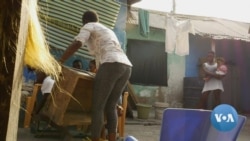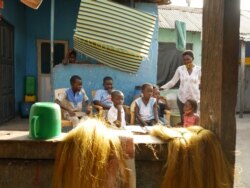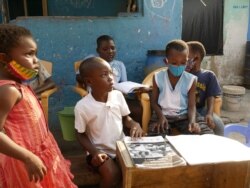Around the world, many children are home because of the coronavirus pandemic, and parents are tasked with juggling their educational needs, running the household and working.
Since Ghana closed schools in mid-March to stem the virus spread, the West African nation has had to quickly pivot to remote learning, with online systems and educational TV shows for students, from kindergarten to tertiary. For the youngest learners, the government has partnered with the U.S. Agency for International Development (USAID) to launch a radio learning program targeting millions of primary school students.
In a bustling community in the Ghanaian capital, Accra, mother Dora Oppey rounds up kids from the neighborhood to join her for a daily radio reading program.
The program began two months after schools closed. Oppey says already her younger son’s reading has improved. However, the program does require input from caregivers and she finds many working parents in her area cannot be home to supervise their children, so she offers to help, monitoring the children while also doing her hairdressing work.
“You know children, even when school vacates and they go [back] to school, when you ask them some things, they are not able to even say it. Look at this long time - from March — and we don’t know the actual time they will ask them to come to school, so that is why I am urging them to learn so by the time school reopens at least they will know something and read, at least,” Oppey said.
The hourlong programs are broadcast six days a week, teaching youngsters letters and sounds. They rely on learning through play. There are songs, games and workbooks for the children to use.
USAID had been helping Ghana with reading programs. While this program is no replacement for face-to-face learning, James Dobson, director of USAID’s education office in Ghana, says the intention is to keep people still interested in learning while schools are closed.
“This really is a democratic approach. It gets out to the whole population because the whole population, like 93%, goes to primary school and this really presents a way of providing services to a large part of your population,” Dobson said.
Ghana’s minister of education, Dr. Matthew Opoku Prempeh, said that from the beginning of the pandemic, the government knew it needed to focus on a range of remote learning initiatives to keep education going for the country’s 9 million learners from kindergarten to tertiary. He said the radio program will still be used post-pandemic.
“We can have parents now using the programs to assist the children at home as well. So the data, the recordings, the resources we have put in and we are digitizing and putting together, it’s going to be of tremendous importance to learning in this country,” Prempeh said.
While some students have gone back to school to complete exams, the government is now looking at a range of options to get everyone back safely. Prempeh says the pandemic has shown the need to use more technology in education.
Jonathan Fletcher, dean of the School of Education and Leadership at the University of Ghana, says technology in learning will require much-needed training for teachers.
“Hopefully, this situation will help our people to learn in different ways, and that will be an additional skill — or people develop expertise in the use of different strategies in teaching,” he said.
Fletcher said despite interventions like the radio program, he did not expect young learners to have progressed at the same pace as compared with being in school, believing the students would be months behind by the time schools reopen. And not everyone has access to the devices needed for remote learning, including radios.
Last week, the World Health Organization and the U.N. children’s fund (UNICEF) urged governments in Africa to promote the safe reopening of schools while taking measures to limit the spread of the coronavirus, stating school closures were harming children in other ways, including increased exposure to violence and exploitation.







